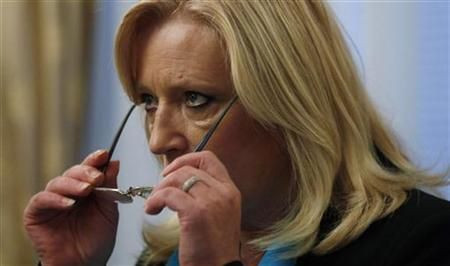Slovak PM Puts Government on Line Ahead of EFSF Vote

Slovak Prime Minister Iveta Radicova put her government on the line on Tuesday by saying that a ballot on expanding the euro zone rescue mechanism that one of her junior ruling partners opposes would also be a vote of confidence in her cabinet.
Slovakia is the last of the 17 euro zone members yet to vote on a deal agreed by the bloc's leaders in July to increase the size and powers of the European Financial Stability Facility.
Three of the four parties in the right-of-center government want to push through the mechanism aimed at preventing the Greek debt crisis from spinning out of control.
But the fourth, the Freedom and Solidarity (SaS) party, has threatened to vote against it, arguing that one of the poorest members of the single currency club should not have to pay for the huge debts racked up by richer states like Greece and Italy.
Radicova and her coalition supporters have vowed to push through the ratification even if they have to ask for the opposition's support -- a scenario that would come into play if Radicova lost the confidence motion.
I have proposed an extraordinary government meeting for 10:30 because the tying of the vote (to a vote of confidence) is a decision of the government and as the prime minister I must submit this proposal to the government, Radicova said.
If Radicova loses the vote, parliament can then put the ratification to repeated votes as soon as she has reached agreement with the opposition. Last-ditch coalition talks failed to produce an agreement on Monday evening.
Any further delay to the ratification of the EFSF expansion, originally envisioned by mid-October, could rattle markets already under pressure from signs that the crisis is spilling beyond Greece's borders.
Belgium won agreement by bank Dexia on the nationalization of its Belgian division on Monday and the Greek central bank effectively nationalized a small bank the same day.
German Chancellor Angela Merkel and French President Nicolas Sarkozy said after talks late on Sunday that they would unveil new measures to solve the debt crisis in the coming weeks but gave few details.
Analysts said that although the SaS brinkmanship would not torpedo the eventual expansion of the EFSF, it might weigh on global sentiment toward the euro zone as the crisis deepened.
The SaS should consider that it could trigger not just a collapse of the government, which is a secondary issue right now, but cause turbulence in Europe and on the markets, said Grigory Meseznikov, director of the Institute for Public Affairs.
All 17 euro zone states must ratify the EFSF expansion for it to take effect. The deal increases its size to 440 billion euros, allows it to buy bonds from the market to support countries under attack by markets, bail out members who need funding and help them prop up failing banks.
Slovakia's leftist opposition-leading Smer party supports the EFSF but has refused to vote for it on Tuesday, betting that government discord can give it a political opening.
It has demanded a government reshuffle or an early election in exchange for its votes, meaning that those coalition partners that support the EFSF can approach it at once for its backing, if the first vote on EFSF expansion fails.
Once the EFSF is voted in, deputies must then approve domestic legislation to implement the deal -- an issue analysts say should not pose a problem once Radicova secures support from either the SaS or the opposition.
(Additional reporting by Martin Santa and Jan Lopatka; Writing by Michael Winfrey; Editing by Tim Pearce)
© Copyright Thomson Reuters 2024. All rights reserved.

















